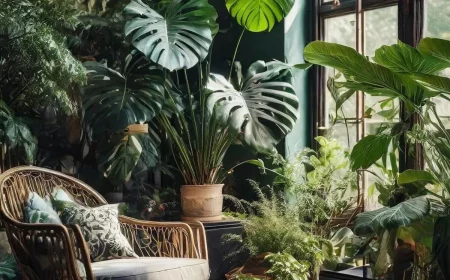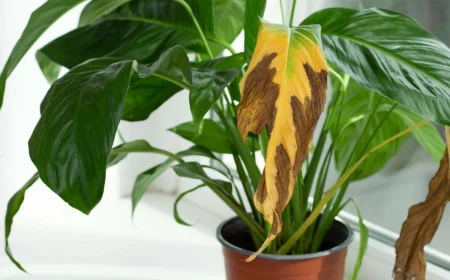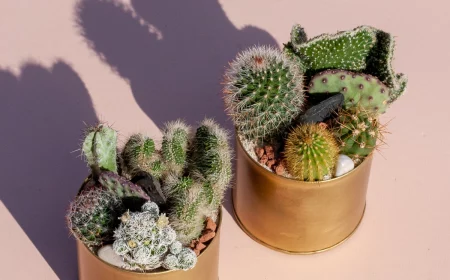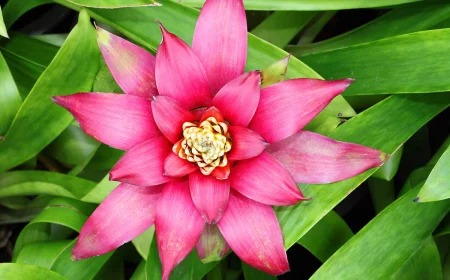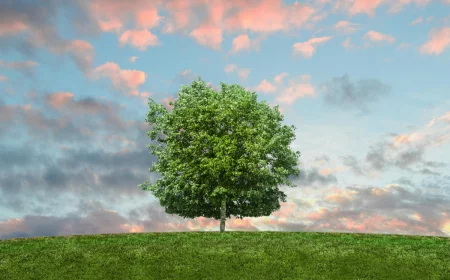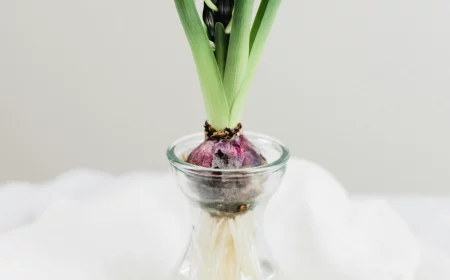Your Tiny Front Yard Isn’t a Lost Cause: A Pro’s Guide to Making It Awesome
You know, after years of designing gardens for people, I can honestly say the small front yards are my favorite puzzles to solve. Anyone can make a huge, open space look decent. But a tiny yard? That forces you to be smart. Every single choice has weight.
In this article
I once had a client in a new subdivision whose front yard was just a sad little rectangle of sod, maybe 15 feet deep. They were completely stumped by it, thinking they were doomed to mow that tiny patch of grass forever. But after we worked on it, we turned it into this inviting little courtyard. We added a winding stone path, layers of plants with different textures, and one stunning Japanese maple that just seemed to glow in the evening. They told me it completely changed how it felt to come home. That’s what this is all about.
This isn’t about chasing trends. It’s about creating a genuine sense of arrival—a space that feels personal, works for you, and actually connects to your home. So, let’s get into the process the pros use to turn a small patch of land into something you can be proud of.

First Things First: The Big Picture Principles
Before you even think about buying a single plant or paver, you have to learn how to trick the eye. Small spaces can feel chaotic if you’re not careful. The experts lean on a few core ideas to make them feel bigger, more organized, and just… better. Understanding the ‘why’ makes all the ‘what to do’ steps a whole lot easier.
Scale and Proportion
This is, without a doubt, the number one mistake I see. People panic and fill a small yard with tons of tiny things—tiny pots, tiny statues, tiny little flowers. It just creates a cluttered mess that actually makes the space feel smaller. Think bigger, but fewer. One large, dramatic planter makes a much stronger statement than ten little pots from the discount aisle. A single, well-chosen specimen tree (that won’t get too massive) has more impact than a dozen busy little shrubs.

It’s just like decorating a small room. You wouldn’t cram it with a bunch of tiny chairs, right? You’d pick a few beautiful, properly sized pieces of furniture.
Sightlines and Focal Points
Where do you want people to look? Your front door is the ultimate destination, but the journey matters. Stand at the curb and look toward your house. What’s the first thing you see? Now stand at your front door and look out. What’s that view like? These are your main sightlines.
A good design gently guides the eye. A softly curving path, for example, can make a yard feel longer because you can’t see the end right away. A cool-looking plant or a small bench placed just so can pull attention away from something you’d rather hide, like that ugly utility box. You’re basically curating the experience.
Repetition and Rhythm
Repeating certain elements is a simple trick that brings a sense of calm and unity. You can repeat a plant, a color, or a material. For instance, if you use bluestone for your walkway, maybe you use a few larger bluestone slabs as stepping stones inside a garden bed. If your house has dark trim, choosing planters in a similar dark color instantly connects the yard to the house. It creates a rhythm that the eye can follow, making the whole scene feel cohesive and intentional.

The Foundation: Walkways and Hardscaping
The hard surfaces in your yard—what we call hardscaping—are the absolute bones of your design. They define the flow, direct traffic, and should last for decades. Getting this part right is critical, and honestly, it’s where I see the most expensive DIY mistakes.
Choosing Your Walkway Material
Your path to the front door is the workhorse of the yard. It needs to be safe, tough, and look like it belongs with your house. There’s no single “best” choice, just the best choice for you.
-
Concrete Pavers: These are the crowd-pleaser for a reason. They’re super versatile, coming in tons of shapes and colors. For a DIYer with some grit, they’re a totally manageable project. A good ballpark for the pavers themselves is around $4 to $8 per square foot. The non-negotiable part is the base. You absolutely must have a 4- to 6-inch compacted base of crushed stone aggregate, topped with a 1-inch layer of sand. I’ve fixed so many lumpy, sinking paver paths that were just laid on dirt. Don’t do it!
-
Natural Stone: If you want that timeless, high-end look, flagstone or bluestone is gorgeous. Every piece is unique. But… it’s a lot more expensive. Be ready for material costs in the $15 to $30 per square foot range, sometimes more. It’s also trickier to work with because of the irregular shapes, but the result is stunning.
-
Gravel or Decomposed Granite: For a softer, more informal vibe, a gravel path is a fantastic and budget-friendly option. I love that satisfying crunch underfoot. The downside is the upkeep. Gravel travels, weeds will eventually try to pop through, and you’ll need to rake it back into place now and then. Heads up: You have to use high-quality landscape fabric underneath and, more importantly, solid edging to keep it contained. I recommend steel or aluminum edging over the cheap plastic kind; it holds its shape way better over the years.

A Quick Word on Tools and Time
If you’re tackling a paver or stone path yourself, you’re going to need a few things. Don’t even start without a good shovel, a wheelbarrow, a hand tamper for smacking down the gravel, a 4-foot level, and some string line and stakes. To do it right, you should really rent a plate compactor from a place like Home Depot for about $75-$100 a day. It makes getting that base solid so much easier.
For a simple 50-square-foot path, a determined DIYer should budget a full weekend: one long day for digging out the sod and old dirt, and then another full day for laying and compacting the base, setting the pavers, and brushing in the sand.
The Fun Part: Choosing Your Plants
Plants are what bring the whole thing to life. But the old saying, “right plant, right place,” is the golden rule of landscaping for a reason. Ignoring it is just a recipe for frustration and a plant graveyard.

First, Spy on Your Yard
Before you hit the nursery, be a detective for a day. Where does the sun hit in the morning? Where is it shady in the afternoon? Most plant tags will tell you if they need full sun (6+ hours), part sun (4-6 hours), or shade. You also need to know your soil. A simple drainage test will tell you a lot. Here’s how: dig a hole about a foot deep and a foot wide. Fill it with water and let it drain completely. Then, fill it up again and time how long it takes to drain. If there’s still water in the hole after 4-5 hours, you’ve got slow-draining, heavy clay soil. If it’s gone in an hour, you’ve got sandy soil. This one piece of info will save you so much guesswork.
By the way, I once got stubborn and tried to plant a gorgeous sun-loving lavender in a spot that was just too shady. I really wanted it there. It died a slow, sad death. Learn from my mistake—don’t fight your conditions!

Layering for a Lush Look
Even in a tiny yard, you can create layers to add depth. Think in terms of height. You might have a small tree as your top layer, some medium-sized shrubs underneath, and low-growing perennials or groundcovers at the front. For example, under a small Dogwood tree, you could plant a few Oakleaf Hydrangeas. In front of those, you could have a nice border of Hosta or Coral Bells. Boom—three distinct layers of texture and color in a pretty small footprint.
Planting for All Four Seasons
A truly great front yard has something interesting to look at all year round, not just for a few weeks in May.
- Spring: Easy mode. Bulbs like daffodils and tulips, plus flowering shrubs like Azaleas.
- Summer: This is all about the leaves. Plants with cool foliage colors and textures carry the garden through the heat. Think Japanese Forest Grass or the deep purples of a Heuchera.
- Fall: The second big show! Look for trees and shrubs known for amazing fall color, like a Serviceberry or Fothergilla.
- Winter: Now the ‘bones’ of the garden are on display. This is where evergreens are critical. A Red-Twig Dogwood with its bright red stems against snow is an absolute showstopper.

Quick Fixes for Common Headaches
Small yards often come with their own special set of problems. Here are a few ways to tackle them.
The “I’m Sick of This Grass” Solution
So many people want to ditch their tiny, awkward-to-mow patch of lawn. This is a fantastic opportunity! Instead of grass, think about a mass planting of a tough groundcover like Liriope or Pachysandra to create a lush green carpet that needs zero mowing. For a sunnier spot, a creeping thyme or sedum can fill in between stepping stones.
A quick tip: If you do this, commit 100%. Remove all the old sod first. A yard that’s half-dead grass and half-new groundcover just looks messy. You can rent a sod cutter for about $100 a day, which makes this job way faster than doing it by hand with a shovel.
Dealing with Slopes
A sloped front yard can be a real pain. The best solution is usually to build terraces—basically, breaking the slope into a series of smaller, level steps. You can build low retaining walls from stacked stone, timbers, or special concrete blocks. Even a short wall, say 18 to 24 inches high, can completely transform a slope into usable, level planting beds.

Heads up! Check your local building codes. In most towns, any retaining wall over 3 or 4 feet high needs a permit and an engineered design. The pressure behind a wall is no joke, and a failure is a big deal. For anything beyond a simple garden wall, call a pro.
Quick Win: The Fastest Front Yard Fix
Don’t have the time or budget for a full renovation right now? Here’s the single best thing you can do: get one oversized, dramatic planter and put it right next to your front door. Plant it with a mix of thrillers, fillers, and spillers. It creates an instant, powerful focal point and makes your entrance feel special. You can do this for under $200, and it makes a world of difference.
Putting It All Together: A Sample Plan & Budget
Let’s go back to that 15×20 foot yard. Here’s a simple, pro-level plan.

First, I’d get rid of the grass and lay down a gently curving path, about 42 inches wide so two people can walk together. I’d use large 24×24 inch concrete pavers set on a proper base.
Next, the plants. On the sunnier side, I’d place a single Japanese Maple as the star. It has amazing color and won’t get too big. Around its base, a big splash of Black-Eyed Susans for summer color.
Along the shadier foundation, I’d plant a trio of reliable hydrangeas. In front of them, a border of a variegated Hosta would brighten up the shady spot with its cool leaves. Here’s a rough shopping list to make it feel real:
- Japanese Maple (5-gallon pot): $150 – $250
- 3 Hydrangeas (3-gallon pots): $40 – $60 each
- 10 Hosta plants (1-gallon pots): $15 – $25 each
- Black-Eyed Susan seeds or plants: $20 – $40
- Pavers, base material, edging: ~$500-$700 depending on paver choice
- Low-voltage lighting kit: $150 – $300
Finally, I’d add a simple low-voltage lighting kit: one uplight aimed at the Japanese Maple and three small path lights to guide people to the door. This simple plan uses all the key principles: a clear path, a strong focal point, layered plants for year-round interest, and proper scale. It’s a space that feels intentional, beautiful, and welcoming.

Your Yard, Your Rules
A small front yard is an opportunity, not a punishment. The most valuable lesson I’ve learned is that a good plan is way more important than a huge budget. Start by just watching your space. Think about how you want it to feel. Invest in quality materials for your path, and choose plants that actually want to live where you are.
Take your time, have fun with it, and don’t be afraid to get your hands dirty. A well-designed front yard is a gift you give yourself every single day.
Inspirational Gallery


Don’t underestimate the power of sound. A small, self-contained water feature can mask street noise and create a serene focal point. Look for simple basin or sphere designs that recirculate water, offering a gentle gurgle that transforms the feeling of your entry space without requiring complex plumbing.

A single Japanese Maple can be the soul of a small garden. Its seasonal color changes provide a year-long performance.


Vertical space is your secret weapon. Instead of spreading out, grow up. A simple trellis with a climbing clematis, a ‘sky pencil’ holly, or a narrow espaliered fruit tree draws the eye upward, making the footprint of the yard feel much more expansive.

Can I mix materials for my walkway?
Absolutely, and it’s a pro move for adding texture. Combining large format concrete pavers, like those from Techo-Bloc, with decorative gravel or a low-growing groundcover like Blue Star Creeper breaks up a monotonous surface. It creates visual interest and can be a clever way to stretch a budget.


For a truly low-maintenance, modern look, consider these three groundcover heroes:
- Dwarf Mondo Grass: A dark green, lush carpet that never needs mowing.
- Creeping Thyme: Drought-tolerant, fragrant when stepped on, and often flowers beautifully.
- Sedum ‘Angelina’: A vibrant chartreuse succulent that thrives in sun and poor soil.

Think in layers, even in a tiny space. Start with a low groundcover, add mid-height perennials like Heuchera or Hostas for foliage texture, and finish with a taller, airy element like a ‘Karl Foerster’ feather reed grass. This layering creates depth and keeps the garden interesting from every angle.


According to a Virginia Tech study, even simple visual access to green space can significantly reduce stress levels within minutes. Your front yard is your first line of defense against a hectic day.
This means that every plant you choose is not just decoration, but an investment in your well-being. Selecting plants with interesting foliage or year-round structure ensures there’s always something calming to look at when you arrive home.

Corten Steel: This industrial-looking weathered steel is perfect for creating raised beds or clean, sharp edging. Its warm, rusty patina provides a stunning contrast against lush green foliage and works equally well in modern or rustic designs.
Fiberglass Planters: Lightweight and available in countless shapes and colors, modern fiberglass planters from brands like Veradek can provide that single, large-scale statement piece the article mentions. They’re durable and can withstand harsh weather better than terracotta.
For a unified look, choose one material for all your hardscape elements.


Lighting is not just for security; it’s for drama. Instead of pointing a floodlight at the door, use uplighting to highlight the texture of a tree’s bark or a particularly beautiful shrub. A wash light can graze a stone wall, while path lights should be aimed down to illuminate the walkway, not the sky.

- Creates a bold, cohesive look.
- Draws the eye to a single, beautiful point.
- Makes choosing plant colors easier.
The trick? Paint your front door a daring color. A deep navy, a vibrant yellow, or a sophisticated aubergine like Farrow & Ball’s ‘Brinjal’ can serve as the anchor for your entire front yard color palette.


How do I handle a small, sloped front yard?
Embrace the slope instead of fighting it. Create low, terraced retaining walls to make level planting areas. A single-level wall can be a great DIY project using stacked stone or timber. For a softer look, use plants known for erosion control, like Juniperus horizontalis or Cotoneaster, which will cascade beautifully down the incline.

The ‘right plant, right place’ mantra is never more critical than in a small garden. A plant that will grow to 15 feet wide has no business in a 5-foot-deep bed, no matter how lovely it looks in its 1-gallon pot at the nursery.

Want to attract more life to your yard? Even one or two pollinator-friendly plants can make a huge difference. Try adding a pot of Salvia ‘May Night’ for bees or Asclepias tuberosa (Butterfly Weed) for monarch butterflies. They provide essential food sources and add vibrant color and movement.


A common mistake: Forgetting about winter. In colder climates, a garden full of only perennials can look bare and sad for months. Ensure you have ‘winter bones’—an evergreen shrub like a boxwood sphere, the interesting bark of a paperbark maple, or the dried heads of ornamental grasses left standing.

The path to your door sets the mood. Consider the feeling you want to evoke.
- Formal & Direct: A straight path of classic brick or bluestone.
- Meandering & Mysterious: A gently curving path of irregular flagstones with groundcover planted in between.
- Modern & Graphic: Large, rectangular concrete pavers set in a line with dark Mexican beach pebbles as filler.


Don’t be afraid of dark foliage. Plants with deep purple or near-black leaves, like the ‘Black Scallop’ Ajuga or ‘Charmed Wine’ Oxalis, create incredible depth and make surrounding green and chartreuse plants pop. They add a touch of sophistication and prevent the garden from becoming a monotonous sea of green.

A study by the National Association of Realtors found that a landscape upgrade can deliver a return on investment of over 100%. A well-designed front yard isn’t just an expense; it’s an asset.


What’s the ‘thriller, filler, spiller’ method for containers?
It’s a foolproof recipe for stunning container arrangements at your doorstep. Thriller: a tall, dramatic plant in the center (e.g., Cordyline). Filler: mounding plants around it (e.g., Petunias, Coleus). Spiller: plants that trail over the edge (e.g., Sweet Potato Vine, Calibrachoa).

Permeable Pavers: These look like regular pavers but are installed with small gaps filled with fine gravel. This allows rainwater to seep into the ground instead of running off into the storm drain, reducing runoff and helping to replenish groundwater. A sustainable and stylish choice for driveways and paths.
Decomposed Granite (DG): A less expensive and more natural-looking alternative to pavers for paths and patios. It packs down to a firm surface but remains permeable. Best used in areas without heavy foot traffic.
Both options are more eco-friendly than traditional concrete or asphalt surfaces.


The scent of a garden is a powerful, often overlooked, layer of design. Plant something fragrant near the door or along the path where you’ll brush past it. A dwarf Gardenia, a sweet-smelling Daphne, or a pot of aromatic rosemary can make coming home a truly sensory experience.

Don’t hide your house numbers. Integrate them into the design. Modern, large-scale house numbers mounted on a custom planter box or a small, dedicated plaque can be a stylish design element in themselves, rather than a purely functional afterthought.


- It adds a polished, finished look.
- It keeps mulch or gravel from spilling onto pathways.
- It prevents lawn grass from creeping into garden beds.
The secret is proper landscape edging. A simple, clean line of steel or aluminum edging is often all that’s needed to give a small yard a crisp, professionally maintained appearance.

If your front yard faces north or is heavily shaded by trees, don’t despair. Embrace the moodiness with shade-loving superstars. Think of the varied textures of Japanese Forest Grass (Hakonechloa), the bold leaves of Hostas, the delicate fronds of Ferns, and the pops of color from Astilbe or Heuchera.
Think beyond the flower. Foliage is the workhorse of a great garden design. The shape, color, and texture of leaves are what provide interest all season long. Contrast the fine, feathery texture of a fern with the bold, waxy leaf of a Hosta, or the silvery-grey of Lamb’s Ear with the deep green of a Boxwood.

